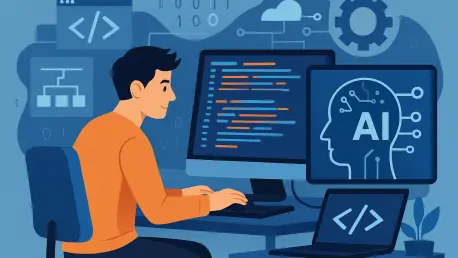Imagine a world where nearly every software developer relies on artificial intelligence to write code, streamline workflows, and tackle complex challenges, yet a significant portion remains skeptical about trusting these tools with critical tasks, highlighting a profound dichotomy at the heart of the industry. This tension is central to a groundbreaking study released by Google Cloud this year, which dives deep into the transformative role of AI in software engineering. Surveying nearly 5,000 IT professionals worldwide, the report uncovers a landscape where AI adoption is no longer a choice but a necessity. It paints a vivid picture of an industry at a crossroads, balancing the immense potential of AI against the risks it introduces. The findings underscore a pivotal shift in DevOps practices, revealing how organizations are grappling with integrating advanced technologies while maintaining stability and trust in their systems. This comprehensive analysis sets the stage for a deeper exploration of how AI is redefining the very fabric of software development.
AI Adoption: A Universal Shift in DevOps
The rapid integration of AI into software development processes stands out as a defining trend in the industry today. A staggering 90 percent of organizations have already embedded AI tools into their workflows, reflecting a near-universal acceptance of this technology across diverse sectors. Among developers, 71 percent actively use AI-driven solutions like chatbots and IDE integrations for tasks such as code generation, highlighting the practical appeal of these innovations. Yet, beneath this widespread adoption lies a layer of caution—61 percent of respondents shy away from allowing AI agents to make direct code changes, and roughly 30 percent express distrust in the reliability of AI-generated outputs. This hesitation points to a critical challenge: while AI offers remarkable efficiency gains, it can also magnify existing flaws in team dynamics or system architectures if not carefully managed. The report emphasizes that successful integration hinges on addressing these concerns through strategic oversight and robust validation mechanisms, ensuring AI serves as a true ally rather than a liability.
Navigating the Future with Strategic AI Frameworks
Delving into actionable insights, the report introduces a structured approach to harnessing AI through the DORA AI Capabilities Model, which outlines seven essential practices for effective implementation. Teams that adopt these practices report more favorable outcomes, experiencing fewer disruptions and greater benefits from AI tools. This model shifts focus away from traditional DevOps metrics like deployment frequency, prioritizing instead AI-specific indicators such as adaptive control systems and dynamic feedback loops. The findings also highlight the urgent need for organizations to rethink governance, infrastructure, and talent development to align with AI’s rapid evolution. Ignoring this technological wave is no longer an option; the pressing question is how to leverage AI to boost software delivery and overall performance. By reframing DevOps through an AI lens, the report provides a roadmap for navigating this complex transition, urging a cultural shift that must balance enthusiasm for AI’s capabilities with a pragmatic approach to its challenges and risks.









